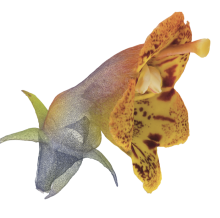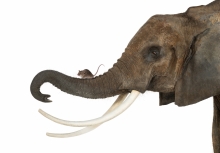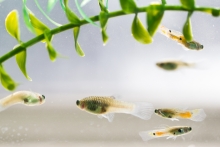Algal growth is accelerating in lakes across Canada, including those far from human development, and a new study shows that climate change is the primary driver.

At the recent COP 15 conference in Montreal, Canada committed to protecting 30% of its land by 2030, but which areas are most crucial to protect for at-risk species such as the spotted turtles?
In a new study published in the Proceedings of the Royal Society, McGill University researchers overlayed maps of species at risk to find hotspots where many species live together. They found that hotspots often overlap.

How much wetland we should protect or restore is not a simple question, such that conservation targets are often set according to political agendas, then standardized globally. However, given their key regulating hydrological functions, wetlands represent nature-based solutions to the anticipated, exacerbating effect of climate change on drought and flood events, which will vary at the regional scale.

To better understand the evolution of flowers, a research team in biology from Université de Montréal , the Montréal Botanical Garden, and McGill University (Daniel Schoen, Biology) have succeeded in using photogrammetry to quickly and precisely build, in three dimensions, a model of a flower from two-dimensional images.
Photogrammetry is commonly used by geographers to reconstruct the topography of a landscape. However, this is the first time that scientists have used the technique to design 3D models of flowers in order to better study them.
On January 12, the Federal Government announced more than $295 million for science, research, and engineering in Canada through the Canada Research Chairs (CRC) 2020-2 cycle, the New Frontiers in Research Fund (NFRF) 2020 Transformation results, and the Tri-agency Scholarships and Fellowships.
Read the full story on the McGill Newsroom or the McGill Reporter.
Below is a list of all CRCs awarded in the 2020-2022 Cycle and McGill Co-PIs and Collaborators NFRF-T 2021-2027:
Read the story on McGill Newsroom
Each McGill recipient will also receive matching funds from the Quebec government for their research endeavours, contributing to the total project funding noted below.
Complete list of CFI JELF-funded projects:
Oana Maria Balmau: Efficient Storage Systems for Real Time Edge Computing
CFI funding: $100,000
Total project funding: $317,032
Biologists now have a better idea of the origin of birds and the evolution of flight, two iconic events in the history of life on earth, thanks to work by a group of international scientists including a McGill professor. In updating the evolutionary tree, the team’s findings show some dinosaurs could fly before they evolved into birds, and many others were experimenting with powered flight.

The health sciences research arm of the Quebec government [Fonds de recherche du Québec – santé (FRQS)] today announced it will provide $2 million to assist in the establishment of the Centre de Recherche en Biologie Structurale (CRBS) at McGill University. The new centre will become the premiere Structural Biology facility in Quebec and a leading centre in Canada, and aims to facilitate structural biology and biophysics for the broader scientific community for the next wave of scientific breakthroughs

A fossilised insect wing discovered in an abandoned mine in Labrador has led palaeontologists from McGill University and the University of Gdańsk to identify a new hairy cicada species that lived around 100 million years ago.
Maculaferrum blaisi, described in a study published in Acta Palaeontologica Polonica, is the first hemipteran insect (true bug) to be discovered at the Redmond Formation, a fossil site from the Cretaceous period near Schefferville, Labrador.

Human population density and land use is causing changes in animal genetic diversity, according to researchers at McGill University.
The findings reported in the journal Ecology Letters, show that environmental changes caused by humans are leading to changes in genetic variation in thousands of species of birds, fish, insects, and mammals. The evidence for human impacts was most clear for insects and fish species.

A new study, published in Science, which focuses on mapping biodiversity change in marine and land ecosystems shows that loss of biodiversity is most prevalent in the tropic, with changes in marine ecosystems outpacing those on land. The research, led by scientists from the University of St Andrews, in collaboration with leading universities across Europe, the USA and Canada, including McGill, aimed at reaching a consensus about variation in biodiversity change.

The diversity of life is staggering. From microscopic algae to elephants, life has devised countless ways to thrive in every environment on the planet. But while biologists have tended to focus on the many varied forms that species have evolved, the age of ‘big data’ offers an unprecedented view of some surprisingly common features shared by all creatures, great and small.

Male guppies exposed to predators in the wild or in captivity have heavier brains than those living in relatively predator-free conditions, according to new research published in the journal Functional Ecology.
Behavioural ecologists at McGill University in Montreal sampled guppies from two rivers in northern Trinidad. In each river, guppies live both above a waterfall, a location that only guppies and a few other small species of fish have managed to colonize, and below the fall, where many predators including pike cichlids live.
One of the world’s 7,000 languages vanishes every other week, and half – including scores of indigenous North American languages -- might not survive the 21st century, experts say. To preserve as much linguistic diversity as possible in the face of this threat, McGill University scientists are proposing to borrow a leaf from conservation biology.

New research by McGill University biologists shows that milder winters have led to physical alterations in two species of mice in southern Quebec in the past 50 years – providing a textbook example of the consequences of climate change for small mammals.
The findings also reveal a stark reversal in the proportions of the two mice populations present in the area, adding to evidence that warming temperatures are driving wildlife north.

